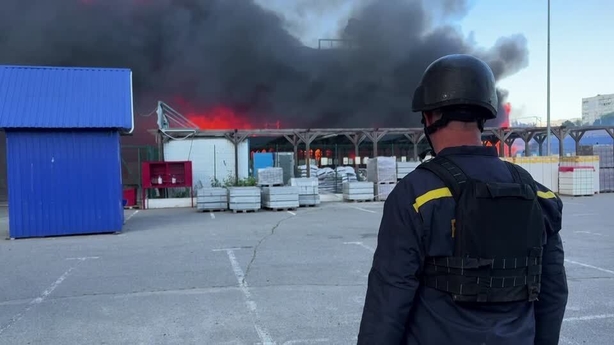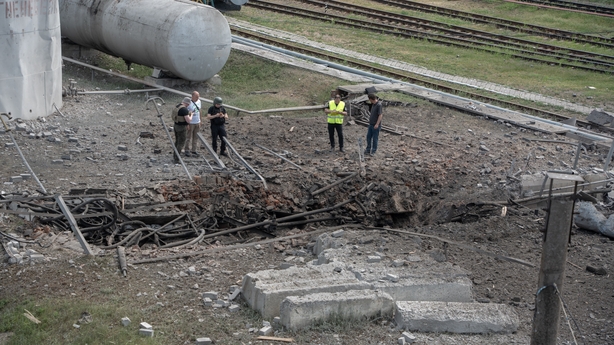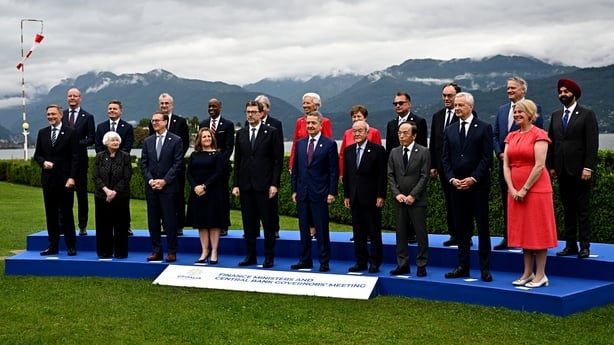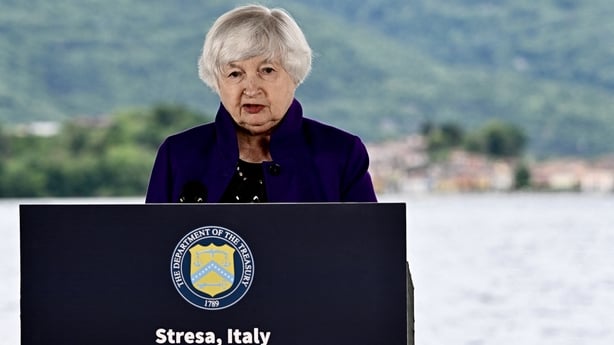Russia bombed a hardware superstore in the eastern Ukrainian city of Kharkiv on Saturday, killing at least six people and wounding 40, Ukraine officials said, in an attack condemned as "vile" by President Volodymyr Zelensky.
Kharkiv regional governor Oleg Synegubov said on Telegram that six people "died on the spot", 40 were wounded and 16 missing after two guided Russian bombs hit the store.
Two of those killed "were men who worked in the hypermarket", Synegubov said earlier in a video on Telegram.
Thick black smoke billowed from the gutted building of the Epitsentr DIY superstore in the northeastern outskirts of the city, as firefighters sprayed water on a blaze sparked by the strikes, AFP journalists saw.
'Everything went dark'
Still wearing her uniform, Lyubov, a cleaner at the hypermarket told how she escaped the building.
"It happened all of a sudden. We didn't understand at first, everything went dark and everything started falling on our heads," she said.
"It was good that my phone lit up, thanks to the flashlight I found where to go, but in front of us everything was burning already."
The Epitsentr chain sells household and DIY goods.
"As of now, we know that more than 200 people could have been inside the hypermarket," Mr Zelensky said on Telegram, condemning the daylight attack on an "obviously civilian" target.
Russia's TASS state news agency cited a security source as claiming that a missile strike destroyed a "military store and command post" inside the shopping centre.
The regional governor said there was "no contact with some of the staff" and "according to our information, visitors could still be in the building".
Kharkiv, Ukraine's second-largest city, is just a few dozen kilometres from the border and regularly comes under attack from Russian missiles.

'Brutal blow'
Later Saturday, another strike hit the centre of Kharkiv, injuring 14 in an area containing a post office, a hairdresser's and a cafe, city mayor Igor Terekhov said.
President Zelensky had visited Kharkiv on Friday and met officials to discuss the defence of the surrounding region.
On Saturday, he urged world leaders to supply Ukraine with "sufficient air defence protection" to "prevent such terrorist attacks".
"Russia struck another brutal blow at our Kharkiv - at a construction hypermarket - on Saturday, right in the middle of the day," Mr Zelensky said.
"Only madmen like Putin are capable of killing and terrorising people in such a vile way," he added, referring to the Russian president who ordered his troops into Ukraine in February 2022.
The latest attacks came after Russia launched a ground offensive in the Kharkiv region on 10 May.
Ukraine said on Friday that it had managed to halt Moscow's progress and was counterattacking.
Ukraine's rescue service posted images of firefighters spraying water inside the blazing Epitsentr store building, with the roof torn open and debris strewn around.
They said the fire had raged over an area of 10,000 square metres but that the firefighters had managed to contain it.
"There were a lot of workers and shoppers inside," Mr Zelensky said.

Border strikes
Russia and Ukraine accused each others' forces of attacks in the border area Saturday.
Russia said that Ukraine shelled a small town in the Belgorod border region, killing two and wounding 10.
Ukraine said Russia shelled the village of Kupiansk-Vuzlovyi, a railway hub in the Kharkiv region near the border, wounding five, the regional prosecutor's office said.
It said two vehicles came under fire: a car with two passengers and an ambulance with a driver, a paramedic and a 64-year-old patient.
Russia also carried out air strikes on the Kupiansk district, damaging a factory and residential buildings, prosecutors said.
In the eastern Donetsk region, shelling on Saturday killed a 40-year-old woman and wounded four, said the head of the regional administration, Vadym Filashkin.
'Progress' on freezing Russian assets

G7 finance ministers have said they were making "progress" in finding ways to use profits from frozen Russian assets to help Ukraine, according to a draft statement from a summit in Italy.
A search for creative yet legally sound solutions was top of the agenda at the two-day Group of Seven meeting in Stresa, northern Italy, as Kyiv continues its urgent appeals for more funds from Western allies in its third year of war with Russia.
"We are making progress in our discussions on potential avenues to bring forward the extraordinary profits stemming from immobilised Russian sovereign assets to the benefit of Ukraine, consistent with international law and our respective legal systems," the ministers said in a draft final statement seen by AFP.
They hope to present possible options to G7 leaders ahead of a summit in Puglia, southern Italy, on 13-15 June.
They reiterated that Russian assets frozen by G7 nations "will remain immobilised until Russia pays for the damage it has caused to Ukraine".
In the draft, they added that they were "committed to further financial and economic sanctions... including continuing to target Russia's energy revenue and future extractive capabilities".
"(The G7 is) ready to impose sanctions on individuals and entities that help Russia acquire advanced materials, technology, and equipment for its military industrial base," added the statement.

The summit - attended by Ukrainian Finance Minister Sergii Marchenko - wrapped up a day after the United States announced a new $275m (€253m) package of aid for Kyiv, part of a $61bn (€56bn) military aid deal passed by Congress last month after months of delays.
Kicking off the finance summit, US Treasury Secretary Janet Yellen had urged her counterparts to embrace "ambitious options" in considering how to use the frozen Russian assets.
A debated US proposal would tap the interest generated by the €300bn of Russian central bank assets frozen by the G7 and EU, creating a $50bn (€46bn) loan facility backed by future interest on the assets.
Last week, the European Union agreed to a more modest plan, using interest from Russian assets frozen by the bloc in what it estimates could generate up to three billion euros a year.
Finance ministers attending the talks had warned that the Stresa summit was not likely to result in a concrete deal.
Read: Latest Ukraine stories
Yesterday, France's Finance Minister Bruno Le Maire described it as a "political agreement in principle, not a turnkey solution".
The G7 ministers also expressed concern in the draft statement over China's trade policies and industrial overcapacity, warning the bloc could take measures to counter them.
The United States has led growing concerns that a surge of low-cost Chinese exports fuelled by Chinese government support in key sectors like solar and electric vehicles pose a risk to global markets.
"While reaffirming our interest in a balanced and reciprocal collaboration, we express concerns about China's comprehensive use of non-market policies and practices that undermines our workers, industries, and economic resilience," the draft statement said.
Saying the G7 would "continue to monitor the potential negative impacts of overcapacity", it said the group "will consider taking steps to ensure a level playing field, in line with World Trade Organization (WTO) principles".
In February, the United States argued that G7 nations should seize the frozen assets outright, an idea it later backed away from due to the concern of allies that it could be a dangerous legal precedent and that Russia could retaliate.
